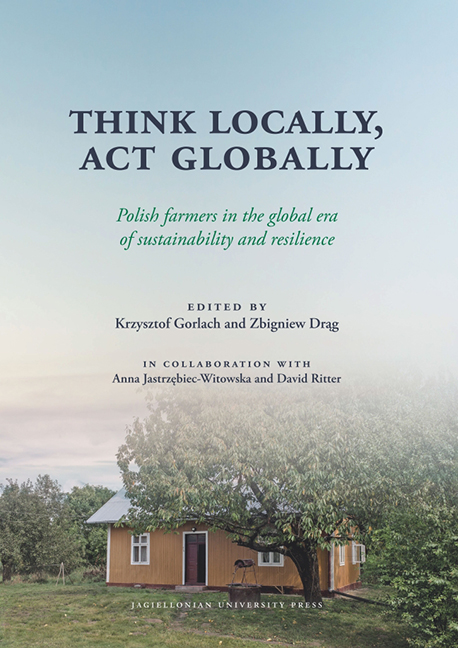Book contents
- Frontmatter
- Contents
- Family Farming: A foreword
- An Introductory Letter from the First Editor: Where the horses, cows, and even cats had their own names
- Part One Theoretical and Methodological Considerations
- Part Two Changes in the Post-Communist Transformation
- Part Three Diversification of Farmers’ Strategies
- Part Four Some Independent Studies
- Conclusion: Some Final Remarks from the First Editor
- Afterword: Renewing a Sociology of Agriculture
- Biograms
Chapter One - Thinking and Acting in the Age of Local–Global Relations: Think locally and act globally
Published online by Cambridge University Press: 16 July 2022
- Frontmatter
- Contents
- Family Farming: A foreword
- An Introductory Letter from the First Editor: Where the horses, cows, and even cats had their own names
- Part One Theoretical and Methodological Considerations
- Part Two Changes in the Post-Communist Transformation
- Part Three Diversification of Farmers’ Strategies
- Part Four Some Independent Studies
- Conclusion: Some Final Remarks from the First Editor
- Afterword: Renewing a Sociology of Agriculture
- Biograms
Summary
Introductory Remarks
The expression “think globally, act locally” has been widely considered a kind of symbolic statement encapsulating a behavioral strategy in the contemporary globalized world. It means that each individual, as well as social collective, should take into consideration some broader and larger spectrum of factors, ideas, and values reflecting much more than the immediate issues of their community or place in order to enact particular strategies for activities performed in their close environment. The basic idea underlying such reasoning is the assumption that every community and every place in the contemporary social space presents a specific permutation and/or particular implementation of more general events, processes, structures, institutions, and solutions relating to social problems.
This perspective draws significantly from the concept of globalization which might be understood, by at least some contemporary authors, as a process of uniformization, or even standardization, of human society, despite some observable social—and especially cultural—differences. The global economy has been noted as a leading force in such an approach.
The phrase “think globally and act locally” has been used frequently in reference to environmental issues. Certain efforts resulting, for example, in the global lowering of carbon dioxide emissions should not necessarily be grounded in some local activities and solutions, but such local initiatives, undertaken in many places and communities, might have an aggregate effect on the global (trans-local) scale. Such reasoning has overemphasized that the cumulative effect of some local activities might result in some global (trans-local) changes. But this problem might be considered in an entirely opposite way. The global-local problem also requires, for example, the analysis of behavior patterns performed by global corporations within some local milieus. As Amey (2013) stresses:
The local action plans of these companies are nothing short of selling their “global” products in “packaging” that may appeal to the preferences of local consumers or fulfill their needs which have been shaped by local context and local traditions (Klekotko et al., 2018, p. 113).
From this perspective, the “global” does not seem to be a kind of “sum of locals.” Quite to the contrary, the local seems to be a consequence of the global impact in a particular context.
- Type
- Chapter
- Information
- Think Locally, Act GloballyPolish farmers in the global era of sustainability and resilience, pp. 31 - 94Publisher: Jagiellonian University PressPrint publication year: 2021



